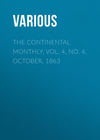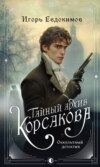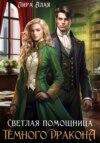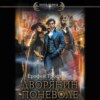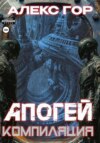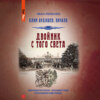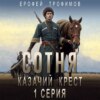Читать книгу: «The Continental Monthly, Vol. 4, No. 4, October, 1863», страница 15
VOICELESS SINGERS
A bird is singing in the leaves
That quiver on yon linden tree;
So soft and clear the song he sings,
The roses listen dreamily.
The crimson buds in clusters cling;
The full, sweet roses blush with bloom;
And, white as ocean's swaying foam,
The lily trembles from the gloom.
I know not why that happy strain
That dies so softly on the air,
That perfect utterance of joy,
Has left a strange, dim sadness there.
Perchance the song, so silver-sweet,
The roses' regal blossoms shrine:
Perchance the bending lily droops,
And trembles, 'neath its thrill divine.
It may be that all beauteous things,
Though lacking music's perfect key,
Have with their inmost being twined
The hidden chords of melody.
So pine they all, to hear again
The song they know, but cannot sing;
The living utterance, full and clear,
Whose voiceless breathings round them cling.
Yet still those accents waken not;
The bird has left the linden tree;
A summer silence falls once more
Upon the listening rose and me.
A DETECTIVE'S STORY
The following is a true story, by a late well-known member of the Detective service, and, with, the exception of some names of persons and places, is given precisely as he himself related it.
Late one Friday afternoon, in the latter part of November, 18—, I was sent for by the chief of the New York Police, and was told there was a case for me. It was a counterfeiting affair. Notes had been forged on a Pennsylvania bank; two men had been apprehended, and were in custody. The first, Springer, had turned State's evidence on his accomplice; who, according to his account, was the prime mover in the business. This man, Daniel Hawes by name, had transferred the notes to a third party, of whom nothing had been ascertained except that he was a young man, wrote a beautiful hand, and had been in town the Monday before. He was the man I was to catch.
It was sundown when I left the superintendent's office. I had not much to guide me: there were hundreds of young men who wrote a beautiful hand, and had been in town last Monday. But I did not trouble myself about what I did not know: I confined myself to what I did know. Upon reflection I thought it probable that my man had been in intimate relations with Hawes for the last few days, probably since Monday last, although it was not known that he had been in town since that day. He might not be a resident in the city; but I decided to seek him here—since, if he had not left town before the arrest of Springer and Hawes, he would not just now run the risk of falling into the hands of the police by going to any railroad station or steamer wharf.
I determined, therefore, to follow up the track of Hawes, and thereby, if possible, strike that of his confederate—which was, in fact, all that could be done.
Hawes was a small broker. He lived in Eighteenth street, and had an office in Wall street.
He lived too far up town, I thought, to go home every day to his dinner; he went then, most probably, always to the same eating house, and one not far from his office.
After inquiring at several restaurants near by, I came to one in Liberty street, where, on asking if Mr. Hawes was in the habit of dining there, the waiter said yes.
'Have you seen a young man here with him, lately?' I inquired.
'No—no one in particular,' replied the waiter.
'Are you sure of it? Come, think.'
After scratching his head for a moment, he said:
'Yes, there has been a young man here speaking to him once or twice.'
'How did he look?'
'He was short, and had black hair and eyes.'
'Who is he? What does he do?'
'He is clerk to Mr. L–, the linen importer.'
'Where does Mr. L– live?'
The waiter did not know. Looking into a Directory, I ascertained his residence to be in Fourteenth street. The stores by this time were closed, so I went immediately to Mr. L–'s house, and asked to see him. He was at dinner.
'I am sorry to disturb him,' said I to the servant, 'but I wish to speak with him a moment on a matter of importance, and cannot wait.'
Mr. L– came out, evidently annoyed at the intrusion.
'Have you such a person in your employment?' said I, describing him.
'No, sir, I have not.'
'You had such a person?'
'I have not now.'
'Did you discharge him?'
'Yes.'
'Why?'
'What business is that of your's?' he asked, rather huffily.
'My name, sir, is M–, of the police. I am after this fellow, that's all. Tell me, if you please, why you discharged him?'
'Oh, I beg your pardon,' said Mr. L–. 'I took you for one of his rascally associates. I discharged him a week or ten days ago. He was a dissipated, good-for-nothing fellow.'
'Was he your bookkeeper?'
'No, he was a junior clerk.'
'Have you any of his handwriting that you can show me?'
He fumbled in a side pocket and drew out a pocketbook from which he took a memorandum of agreement, or some paper of the sort, to the bottom of which a signature was attached as witness.
'That's his writing,' said he.
It was a stiff schoolboy's scrawl.
This was not my man then. I apologized to Mr. L– for the trouble I had given him, and withdrew.
Lost time, said I to myself. I am on the wrong track. I must back to the eating house, and begin the chase again from the point where I left off. I saw the same waiter.
'I want you to think again,' said I, 'Try hard to remember whether there was never any other man here with Hawes on any occasion.'
After reflecting for a little while, he said he thought he recollected his going up stairs not long ago, with another man, to a private room.
'Did you wait on him yourself at the time you speak of?' I asked.
'No—most likely it was Joe Harris.'
'Will you send for him, if you please.'
Joe Harris came.
'You waited on Mr. Hawes a few days ago, when he dined with another gentleman in a private room up stairs, didn't you?'
'Yes, sir.'
'Who was that other man?'
'He is a young man who is clerk in a livery stable in Sullivan street.'
'What are his looks?'
'He is tall and light haired.'
'Do you know his name?'
'His name is Edgar.'
I hurried up to Sullivan street, went into the first livery stable I came to, inquired for the proprietor, and asked him if he had a young man in his stable of the name of Edgar.
He said he had.
'Does he keep your books?'
'Yes, he takes orders for me.'
'Let me see some of his handwriting, if you please.'
He stepped back into the office and took from a desk a little order book. I opened it: there were some orders, hastily written, no doubt, but in a hand almost like beautiful copperplate.
This was my man—I felt nearly certain of it. I asked where he lived, and was told, with his mother, a widow woman, at such a number in Hudson street. I started for the place. It was now nine o'clock. Arriving at the house, I rang the bell. It was answered by a servant girl.
'Does Mr. Edgar live here?' I inquired.
'Yes, sir.'
'Is he at home?'
'No, sir.'
'When will he come home?'
'I don't know.'
'Does he sleep here?'
'Sometimes he does, and sometimes he doesn't.'
'Where is he likely to be found? I should like to see him.'
She said she really didn't know, unless perhaps he might be at a billiard saloon not far off. I went there. A noisy crowd was around the bar. I looked around the room and closely scrutinized every face. No tall, light-haired young man was there. I asked the barkeeper if Mr. Edgar had been there that evening. He said no, he had not seen anything of him for two or three days, I asked him if there was any other place he knew of that Edgar frequented, and was told he went a good deal to a bowling alley in West Broadway near Duane street. Not much yet, I thought, as I hurried on to West Broadway. Descending a few steps into a basement, I entered a sort of vestibule or office to the bowling saloon. 'Has Mr. Edgar been here this evening?' I inquired of the man in attendance.
'He is here now,' was the reply, 'in the other room, through that door.'
I passed through the door indicated into the bowling alley, and accosted the marker:
'Is Mr. Edgar here?'
'He has just gone—fifteen minutes ago.'
'Do you know where he went to?'
'Seems to me some of them said something about going to the Lafayette Theatre.'
I am on his track now—I said to myself—only fifteen minutes behind him. I bent my steps to the theatre—taking with, me a comrade in the police service, whom I had encountered as I was leaving the saloon. We hurried on with the utmost rapidity, but on reaching the theatre, found, to my disgust, what I had already feared, that the play was over, and the theatre just closed.
'Better give it up for to-night,' said my companion; 'we know enough about him now, and can take up the search again to-morrow.'
'It won't do, Clarke,' said I, 'we have inquired for him at too many places. Stay, I've a notion he may be heard of at some of these oyster cellars hereabouts.'
I went down into one of them, and asked if a tall young man with light hair had been there that evening. A tall young man with light hair and mustache had come in from the theatre with a lady, and had just left. I asked my informant if he knew the lady. She was a Miss Kearney, he answered.
'What?' I continued, 'didn't her sister marry the actor Levison?'
'Yes, the same person.'
'He lives in Walker street, near the Bowery, I believe?'
'Yes, I think so,' replied the man.
I considered a moment. Of course no one could tell me where Edgar had gone to; but I was tolerably certain he had gone home with the girl. Where she lived I did not know, but I thought it probable the actor could tell me. So we started on to Walker street. There are—or were at the time I speak of—several boarding houses in Walker street. We passed one or two three-story houses with marble steps. 'Shall I ask along here?' said Clarke. 'No,' I answered; 'poor actors don't board there; we must look for him farther on.' We kept on, and after a little while, we found one that seemed to me to be likely to be the house we were looking for. I rang the bell and inquired for Mr. Levison. He was gone to bed. It was now twelve o'clock. I desired the man that opened the door to tell him that some one was below who wished to see him immediately. He soon returned, saying that Mr. Levison was in bed, and could not be disturbed: I must leave my business, or call again next day.
I thought it necessary to frighten him a little; so I sent up word that I was an officer of police, and he must come down instantly, or I should go up and fetch him. In a few moments the actor made his appearance, terribly frightened. Before I could say anything he began to pour out such a flood of questions and asseverations that I could not get a word in: What did I want with him? I had come to the wrong man; he hadn't been doing anything, etc., etc. 'I don't want you,' I began—but it was of no use, I could not stop him; his character was excellent, anybody would vouch for him; I ought to be more sure what I was about before I roused people from their beds at midnight, etc., etc. His huddled words and apprehensive looks made me suspect there was something wrong with him; but it was no concern of mine then. I seized him by the shoulder, and ordered him to be quiet.
'Don't utter another word,' said I, 'except to answer my questions, or I'll carry you off and lock you up. I have not come to arrest you. I only want to ask you a few questions. Haven't you a sister-in-law named Miss Kearney?'
'Yes, what do you want with her?'
'I am not going to do her any harm. I only want to know where she lives.'
'Oh! she lives in – street.'
'Do you know the number?'
'Goodness, yes; it is number 34. I have boarded there myself until only a little while ago.'
'Indeed!'
'Yes, I have got a dead-latch key somewhere about.'
'The deuce you have! Give it to me; it is just what I want.'
'Give you a dead-latch key! a pretty notion!'
'I wouldn't give it to any man—not to all the detective squad in New York.'
'Look here, my friend, I am M–, pretty well known in this town. I have a good many opportunities in the course of my business to do people good turns, and not a few to do them ill turns. It is a convenient vocation to pay off scores, particularly to persons of your sort. If you will give me that key, I'll make it worth your while the first chance I have. If you don't, you'll be sorry; that's all."
I gave him a significant look as I concluded. He looked me in the face a minute—as if to see how much I meant, or if I suspected anything; then turned and ran up stairs. In a few moments he came down, and handed me the key. I took it with satisfaction.
'Now,' said I, 'you'll have no objections to telling me where your sister-in-law's room in the house is.'
'Third story, back room, second door to the left from the head of the stairs.'
'Thank you, good night.'
We walked rapidly to – street, and reaching the house, I stopped a moment to examine my pistols, by the street lamp, and then softly opened the door. Clarke and I stepped in, and I shut the door.
Leaving my comrade in the hall, I crept noiselessly up stairs, and tapped at the door of the room.
'Who is there?' called out a woman's voice. 'Open the door,' I replied, 'and I'll tell you what I want.'
'You can't come in. I have gone to bed.'
'Oh, well, I am a married man; I'll do you no harm; but you must let me in, or I shall force the door.'
After a moment's delay the door was opened by a young woman in a morning wrapper, who stood as if awaiting an explanation of the intrusion. I passed by her, and walked up to a young man sitting in a low chair by the fire, and tapping him on the shoulder, said: 'You are my prisoner.' He raised his head and looked up. 'Why, Bill,' I exclaimed, 'is this you? I have been looking for you all night under a wrong name. If I had known it was you, I'd have caught you in an hour.' And so I would.
It is only necessary to say further, that he was the man I was set to catch. I may add, however, that a large amount of the counterfeit notes, and the plates on which they were printed, were secured, and the criminal sent to Sing Sing in due course of law.
LITERARY NOTICES
Flower for the Parlour and Garden. By Edward Sprague Rand, jr. Boston: J.E. Tilton & Co. Price $2.50.
J.E. Tilton & Co. are the publishers of the series of photographic and lithographic cards of flowers, leaves, mosses, butterflies, hummingbirds, &c., noted for their beauty of execution. 'Flowers are so universally loved, and accepted everywhere as necessities of the moral life, that whatever can be done to render their cultivation easy, and to bring them to perfection in the vicinity of, or within, the household, must be regarded as a benefaction.' This benefit our author has certainly conferred upon us. The gift is from one who must himself have loved these lily cups and floral bells of perfume, and will be warmly welcomed by all who prize their loveliness. In the pages of this book may be found accurate and detailed information on all subjects likely to be of interest to their cultivators. We give a list of the contents of its chapters, to show how wide a field it covers. Chap. I. The Green-House and Conservatory. Chap. II. Window Gardening. Chap. III, IV, V, VI. Plants for Window Gardening. VII. Cape Bulbs. VIII. Dutch Bulbs. IX. The Culture of the Tube Rose. X. The Gladiolus and its culture. XI. How to force flowers to bloom in Winter. XII. Balcony Gardening. XIII. The Wardian Case and Winter Garden. XIV. Stocking and Managing Wardian Cases. XV. Hanging Baskets and Suitable Plants, and Treatment of Ivy. XVI. The Waltonian Case. XVII. The Aquarium and Water Plants. XVIII. How to grow specimen Plants. XIX. Out Door Gardening, Hot Beds. XX. The Garden. XXI. Small Trees and Shrubs. XXII. Hardy Herbaceous Plants. XXIII. Hardy Annuals. XXIV. Bedding Plants. XXV. Hardy and half hardy Garden Bulbs. XXVI. Spring Flowers and where to find them.
The appearance of this book is singularly elegant, its tinted paper soft and creamy, its type clear and beautiful, its quotations evince poetic culture, and its illustrations are exquisitely graceful. It is a real pleasure to turn over its attractive leaves with the names of loved old flower-friends greeting us on every page, and new claimants with new hopes and types of beauty constantly starting up before us. What with Waltonian cases, hanging baskets, Wardian cases, &c., our ladies may adorn their parlors with artistic taste with these fragrant, fragile, rainbow-hued children of Nature.
'Bright gems of earth, in which perchance we see
"What Eden was, what Paradise may be.'
'From the contemplation of nature's beauty there is but the uplifting of the eye to the footstool of the Creator.'
Hospital Transports. A Memoir of the Embarkation of the Sick and Wounded from the Peninsula of Virginia in the Summer of 1862. Compiled and published at the request of the Sanitary Commission. Boston: Ticknor & Fields. For sale by D. Appleton & Co., New York.
A book which should be in the hands of all who love their country. The Sanitary Commission deserve the undying gratitude of the nation. Their organization is one of pure benevolence; the men and women working effectively through its beneficent channel have given evidence of some of the noblest and divinest attributes of the human soul. It is difficult to form any idea of the magnitude and importance of the work the commission has achieved. 'Never till every soldier whose last moments it has soothed, till every soldier whose flickering life it has gently steadied into continuance, whose waning reason it has softly lulled into quiet, whose chilled blood it has warmed into healthful play, whose failing frame it has nourished into strength, whose fainting heart it has comforted with sympathy,—never, until every full soul has poured out its story of gratitude and thanksgiving, will the record be complete; but long before that time, ever since the moment that its helping hand was first held forth, comes the Blessed Voice: 'Inasmuch as ye have done it unto one of the least of these my brethren, ye have done it unto me.''
'The blessings of thousands who were ready to perish, and tens of thousands who love their country and their kind, rest upon those who originated, and those who sustain this noble work.'
This book is full of vivid interest, of true incident, of graphic sketches, of loyalty, patriotism, and self-abnegation, whether of men or of noble women, and recommends itself to all who love and would fain succor the human race.
Austin Elliot. By Henry Kingsley, Author of Ravenshoe, etc. Boston: Ticknor & Fields. For sale by D. Appleton & Co. New York.
A graphic novel of considerable ability, and more than usual interest. The tone is highly moral throughout. The lessons on duelling are excellent. Would that our young men would lay them to heart! The characters are, many of them, well drawn and sustained—we confess to a sincere affection for the Highlander, Gil Macdonald, and the Scotch sheep-dog, Robin. Many of the scenes in which they appear are full of simple and natural pathos.
Husband and Wife; or, The Science of Human Development through Inherited Tendencies. By the Author of the Parent's Guide, etc. Carleton, publisher, 413 Broadway, New York.
A suggestive book on an important subject. The writer assumes that 'there are laws of hereditary transmission in the mental and moral, as well as the physical constitution. Precisely what these laws are, she does not assume to state. Such as are well known will however be helpful to all, and will facilitate the discovery of those yet hidden from us. Women, who bear such an important part in parentage, should be the most clear-sighted students of nature in these things. It is to woman that humanity must look for the abatement of many frightful evils, malformation, idiocy, insanity, &c., yet the principles pertaining to the knowledge of her own duties and powers, which ought to be a part of the instruction of every woman, are rarely placed before her. Much that pertains to the same phenomena among the lower animals may properly constitute a part of her studies in natural history; but with the laws which govern the most momentous of all social effects—the moral and mental constitution of individuals composing society—with the gravest of possible results to herself—the embodiment of power and weakness, capacity or incapacity, worth or worthlessness in her own offspring, she is forbidden all acquaintance. Yet when she assumes the duties and responsibilities of maternity, such knowledge would be more valuable to her and to those dearest to her, than all of the treasures of the gold-bearing lands, if poured at her feet.'
The laws of hereditary transmission make the staple of this book. It is written by a lady, and will commend itself to all interested in this subject. Pearl, in the Scarlet Letter, and Elsie Venner, are artistic exemplifications of such disregarded truths.
Victor Hugo, by a Witness of his Life: Madame Hugo. Translated from the French, by Charles Edwin Wilbour, translator of 'Les Miserables.' Carleton, publisher, 413 Broadway, New York.
A biography of a remarkable man, written by a constant observer of his actions, almost a second self, can scarcely fail to prove interesting. In this case the interest is increased by its close connection with a popular novel. Indeed, the readers of 'Les Miserables' will be astonished to find what a flood of light is thrown upon that master work by this charming life-history of its author. Marius is but a free variation of Victor Hugo himself. In Joly, the old school-mate of the Pension Cordier, the author of Jean Valjean becomes closely acquainted with a real galley slave. In short, the great romance is a part of the life of Victor Hugo, and cannot be fully understood without the biography—its completion.'
Life and Times of Sir William Johnson, Baronet.
J. Munsell, 78 State street, Albany, announces for publication by subscription, 'The Life and Times of Sir William Johnson, Baronet.' The work is by William L. Stone, son of Colonel Stone, well known as editor and biographer. The materials of this Life were derived from original papers furnished by the family of Sir William, from his own diary, and other sources which have never before been consulted. The work was begun by the late William L. Stone, has been completed by his son, and with the Lives of Brant and Red Jacket, brings down the history of the Six Nations and their relations with Great Britain, from 1560 to 1824. The edition will be very nearly confined to the number subscribed for. Price $5, payable on delivery.
Sir William Johnson was Superintendent of Indian Affairs in this country before the Revolution, was distinguished in Colonial history, and active in the French and Indian war. His life was one of romantic interest and vicissitude. The work is highly spoken of by the literati who have seen the advance sheets. Jared Sparks, George Bancroft, F. Parkman, G.W. Curtis, Lewis Cass, &c., testify to its interest and historical accuracy. From the well-known ability of its author, it may be safely and highly commended to the reading and thinking public.
Beyond the Lines; or, a Yankee Prisoner Loose in Dixie. By Captain J.J. Geer, late of General Buckland's Staff. Philadelphia: J.W. Daughaday, publisher, 1308 Chestnut street.
Captain John J. Geer was, before the war, a minister of the Methodist Church in Ohio, was taken prisoner before the battle of Shiloh, in a skirmish with Beauregard's pickets, passed some months in rebel prisons, made his escape, and pleasantly tells the story of his adventures. He reports that the large slave-holders and the wretched clay-eaters are all Secessionists, but that a large middle class, people who own but few slaves and till their own fields, are mostly true to the Union, in the parts of the South he visited. The book is one of incident, contains many curious pictures of life and character, and will address itself to a large class of readers.
The Amber Gods, and other Stories. By Harriet Elizabeth Prescott. Ticknor & Fields, Boston. For sale by D. Appleton & Co., New York.
The many readers of Miss Prescott will be glad to welcome the present collection of her very popular tales. It contains: The Amber Gods. In a Cellar. Knitting Sale-Socks. Circumstance. Desert Lands. Midsummer and May. The South Breaker.
Few writers have attained distinction and recognition so immediately as Miss Prescott. Her fancy is brilliant, her style glowing, and culture and varied information mark the products of her pen.
Philip Van Artevelde; a Dramatic Romance. Ticknor & Fields, Boston. For sale by D. Appleton & Co., New York.
An historical romance, cast in a dramatic and rhythmical form, by Henry Taylor. It has been too long known to the community to require any commendation at the present date. It has gone through many editions in England. We are glad to see it in the convenient and pleasant form of Ticknor's "Blue and Gold," so well known to American readers.
The British American; a Colonial Magazine. Published monthly by Messrs. Rollo & Adam, 61 King street, Toronto, Canada West.
The articles of this magazine are of varied interest, generally well written and able. "What is Spectrum Analysis?" given by the Editor in the August number, is a contribution of research and merit.
The Christian Examiner. Boston: By the proprietors, at Walker, Wise & Co.'s, 245 Washington street.
Contents: Tertullian and Montanism. The Reality of Fiction. Rome in the Middle Age. Zschokke's Religious Meditations. Henry James on Creation. Loyalty in the West. Altar, Pulpit, and Platform, A Month of Victory and its Results. Review of Current Literature. Theology.
